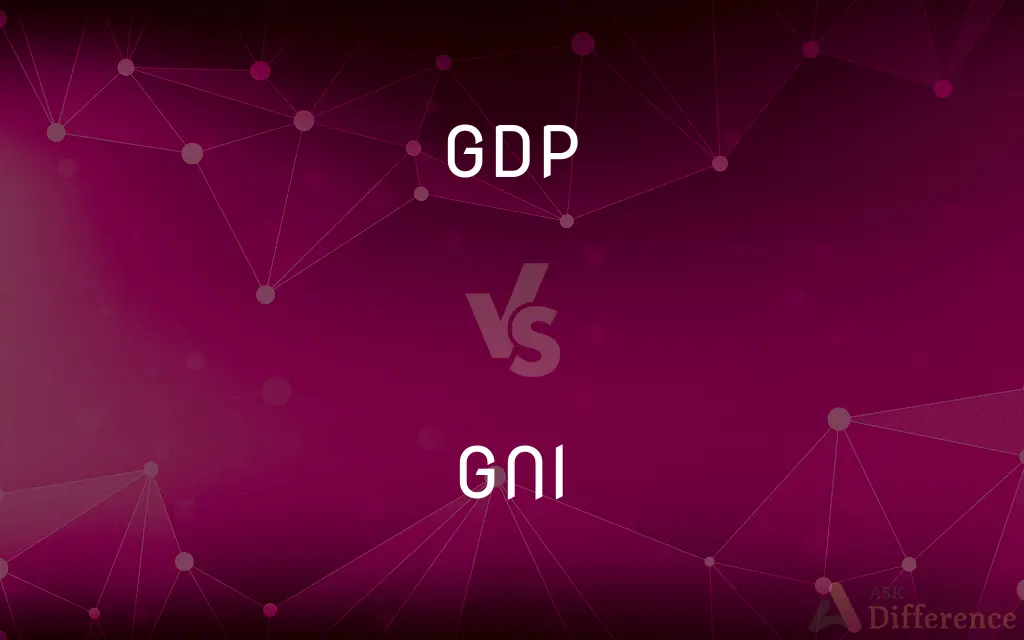GDP vs. GNI — What's the Difference?
By Tayyaba Rehman — Published on October 10, 2023
GDP (Gross Domestic Product) measures a country's economic output within its borders; GNI (Gross National Income) includes its international income. They are vital economic indicators, differing by domestic vs. global income inclusion.

Difference Between GDP and GNI
Table of Contents
ADVERTISEMENT
Key Differences
GDP is the total value of goods and services produced within the borders of a country. It’s a critical measure of economic health. It doesn’t matter who produces it; as long as it’s produced within the country, it’s included in the GDP. GNI, on the other hand, is a measure of the total income earned by a country’s residents and businesses, including any international income. GNI considers the value generated by the country's residents both domestically and abroad.
While GDP focuses strictly on the location of production, GNI turns its attention to ownership. When a country’s businesses own a significant amount of the productive activities in foreign countries, its GNI will be significantly larger than its GDP. Conversely, when foreign businesses own a considerable amount of productive activities within a country, the GDP will be larger than the GNI.
The calculation of GDP is based on the expenditure approach, the income approach, or the production approach. GDP is crucial to economists and policymakers for economic planning and policy formulation. GNI, conversely, helps to understand the economic strength of a country and its residents' average living standards. It’s especially useful when comparing the economic well-being between different countries as it includes international operations and transactions.
In the case of countries with a significant number of foreign companies operating within their borders, the GDP would give a skewed impression of the national economic well-being, and GNI would provide a more accurate picture. Both GDP and GNI are crucial for assessing a country’s economic health, its development over time, and its standing in international markets. They offer different perspectives and insights, underlining the importance of considering both when analyzing a country’s economic state.
Comparison Chart
Definition
Value of goods and services produced within a country's borders
Total income earned by residents and businesses of a country
ADVERTISEMENT
Focus
Location of production
Ownership of production
International Transactions
Does not include international transactions and income earned abroad by nationals
Includes international transactions and income earned abroad by nationals
Use
Measures economic health, helpful for economic planning and policy formulation
Indicates economic strength and average living standards of residents
Calculation Approach
Based on expenditure, income, or production approach
Incorporates all income earned by residents and businesses, domestic and abroad
Compare with Definitions
GDP
Production, income, and expenditure.
The production approach to GDP calculates the total output produced by the nation.
GNI
GNI is an essential indicator of a country's economic strength and the average living standards of its residents.
High GNI often correlates with better quality of life and advanced infrastructure.
GDP
GDP is a comprehensive measure of a nation's overall economic activity.
A decline in GDP usually signifies a slowdown in economic activity.
GNI
GNI provides a broader and more accurate picture of the economic well-being of a country compared to GDP.
Analysts prefer GNI over GDP when comparing the economic well-being of different countries as it considers international income.
GDP
GDP is crucial for economic planning and to formulate policies.
Policymakers often rely on GDP growth to shape economic policies.
GNI
GNI includes the value of income flowing back to the country from its residents and businesses working abroad.
Remittances from citizens working overseas are a significant component of a country's GNI.
GDP
GDP is the total monetary or market value of all final goods and services produced within a country's border in a specific timeframe.
The GDP of the country has seen a steady increase over the last decade.
GNI
GNI is the total income earned by a country’s residents and businesses, including any international income.
The GNI of a country reflects the economic prosperity of its residents.
GDP
GDP includes the value of production occurring within a country's borders regardless of who owns the means of production.
The presence of foreign companies significantly contributes to the GDP of the host country.
GNI
GNI considers all economic activities, domestic and international, by a country’s residents.
Countries with many international corporations have a higher GNI due to income from foreign investments.
GDP
Measure of the United States economy adopted in 1991; the total market values of goods and services by produced by workers and capital within the United States borders during a given period (usually 1 year)
Common Curiosities
What is the priority of a fixed charge in case of default?
Lenders with fixed charges have a priority claim on the specified assets.
What is a fixed charge?
A fixed charge is a predetermined claim secured against specific assets.
What types of assets can be subject to a fixed charge?
Examples include real estate, machinery, vehicles, and identified property.
What is a floating charge?
A floating charge is a claim on a changing pool of assets, often a company's entire asset base.
How does a fixed charge impact the borrower's use of the assets?
Borrowers typically retain the right to use the assets but with the understanding of lender's priority.
In which financial arrangements is a floating charge commonly found?
Floating charges are often associated with debentures, overdraft facilities, and corporate financing arrangements.
Where is a fixed charge commonly used?
Fixed charges are common in mortgages, equipment loans, and asset-specific financing.
What distinguishes a floating charge from a fixed charge?
A floating charge covers assets that can change in nature and value over time.
How does a floating charge impact a company's operations?
It allows the company to use and manage assets in the ordinary course of business until a default occurs.
What is the priority of a floating charge in case of default?
Creditors with floating charges have a general claim and typically lower priority compared to fixed charge holders.
Share Your Discovery

Previous Comparison
Assumptively vs. Assumably
Next Comparison
CPU vs. ALUAuthor Spotlight
Written by
Tayyaba RehmanTayyaba Rehman is a distinguished writer, currently serving as a primary contributor to askdifference.com. As a researcher in semantics and etymology, Tayyaba's passion for the complexity of languages and their distinctions has found a perfect home on the platform. Tayyaba delves into the intricacies of language, distinguishing between commonly confused words and phrases, thereby providing clarity for readers worldwide.
















































